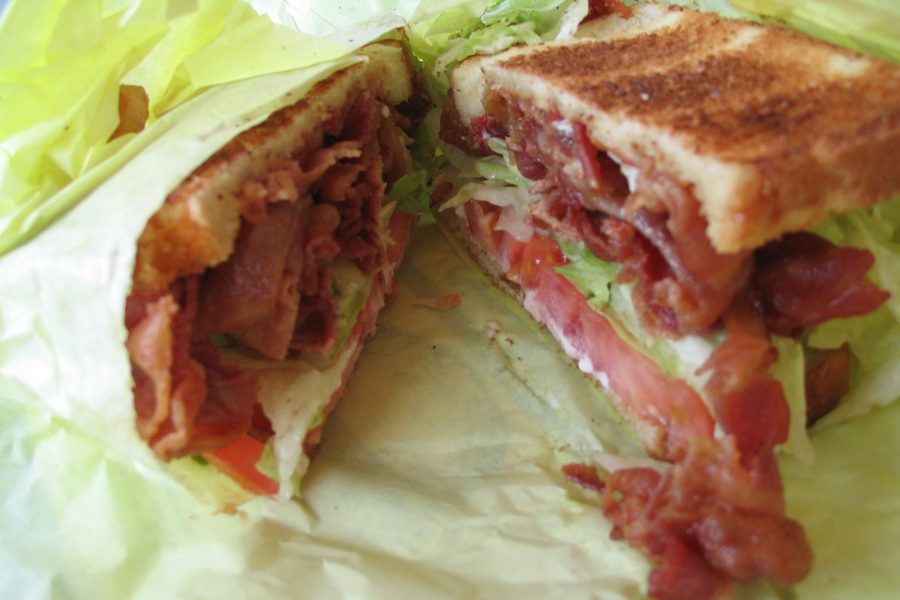“So many people tell me, ‘I could be a vegan if it weren’t for bacon,’ and I tell them, ‘be a vegan who eats bacon,'” vegan chef, Tal Ronnen said in an interview with the Los Angeles Times. Ronnen is the founder and chef of Crossroads, a highly-acclaimed, fine-dining vegan restaurant. This quote is for all those people who make excuses as to why they can’t go vegan. Many militant vegans will disagree with this quote, but I agree. I would rather encourage people to eat as close to vegan as possible, rather than discourage them. Eating a more plant-based diet is more sustainable for our environment, and better for our health. Obviously, you wouldn’t be vegan if you ate bacon, but you get the idea.
Veganism is extremely important in today’s climate, quite literally. Climate change is happening whether you believe it or not. Bear with me here, but what you eat actually affects the climate. One of the biggest contributors to climate change is animal agriculture, specifically the methane produced by cow farts. Methane is a greenhouse gas that absorbs the sun’s heat and warms the Earth. We factory farm our animals, which means that we constantly breed them, which produces more cows than Earth can handle. According to the Food and Agriculture Organization of the United Nations, 18 percent of greenhouse gas emissions come from animal agriculture, which is more than the combined amount of exhaust from transportation. Cows produce about 150 billion gallons of methane per day, according to the Journal of Animal Science. Also, animal agriculture is responsible for 80-90 percent of water consumption in the United States. So much water goes into growing food for the animals, but we wouldn’t have so many animals if we left them alone and stopped breeding them. It takes 2,500 gallons of water to produce one pound of beef, according to earthsave.org. At this point, the Earth needs all the help it can get.
It is important to eat as little meat as possible, because its production has the most negative impact, but the meat industry is perpetuated by the dairy industry. The process of factory farming cows starts with the farmers breeding the cows. Once the cow gives birth, they take away the babies and use the mother for its milk. If the calf is a boy, they kill it for veal, but if it’s a girl, they raise it so they can continue the cycle. Therefore, consuming dairy is just as bad as consuming meat. It’s cruel, and it only keeps the meat industry going. According to cowspiracy.com, each day, a person who follows a vegan diet saves 1,100 gallons of water, 45 pounds of grain, 30 square feet of forested land, and 20 pounds of carbon dioxide equivalent.
This information can be overwhelming, but there are simple ways to become a part of the solution. Graham Hill, a journalist, gave a TED Talk on being a weekday vegetarian. He presents the idea of only treating yourself to meat on the weekends, which still lessens the environmental impact. Also, the “Meatless Mondays” movement has been an ongoing movement that has gone mainstream. Some natural and satisfying meat replacements are legumes, hearty vegetables like broccoli and cauliflower, and imitation meat. Overall, having a plant-based diet with little to no animal products is still okay.
There are so many plant milks and dairy alternatives that are so much better for the environment than dairy. I influenced my dad to try coconut milk coffee creamer instead of dairy creamer, because small changes count. Many of my family members have incorporated a meatless day into their week and I think it’s a wonderful idea. I am vegan, but I live with my non-vegan family and we have cut back so much on our animal product intake as a household.
The inner animal-rights advocate in me wants everyone to stop eating animals and their by-products all together. However, the inner tree-hugger and nutrition enthusiast in me just wants people to cut back on their animal product intake, because anything helps. I am in no way advocating for people to eat animal products, but I understand why people do. Many people don’t care to go vegan because the ethical, environmental or health aspects don’t resonate with them. Some people think veganism is just a fad diet and nothing else. Others might care about the causes that veganism helps, but they are too intimidated to ditch the foods they’ve been eating their whole lives.
I understand that not everyone in the world is going to go vegan, but it is really important that we all make an effort. If cheese is the only thing stopping you from being vegan, then eat a mostly plant-based diet and treat yourself to some cheese every once in a while. Don’t listen to my fellow vegans if all they are doing is discouraging you from going vegan. Live your life, go at your own pace, but also be conscious of the effects your diet has on the world



